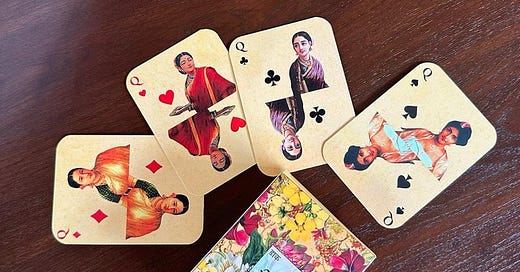From Darkness to Light: VS Naipaul’s Nobel Prize Acceptance Speech
This week in Daak:
1. From Darkness to Light: VS Naipaul’s Nobel Prize Acceptance Speech
2. Check Our Our Raja Ravi Varma Inspired Playing Cards
3. Daak Recommends
1. From Darkness to Light: VS Naipaul’s Nobel Prize Acceptance Speech
One can say many things about Literature. But at its very core, it is an attempt to understand the different worlds that exist both outside and inside of us; to go from a state of ambiguity to knowledge, or as VS Naipaul puts it in his Nobel Prize acceptance speech, to go from darkness to light.
Born in Trinidad to an Indian immigrant family, Naipaul grew up observing a juxtaposition of cultures that gave his life a kind of doubleness. It was only as an adult with enough time and distance, that he began to unravel these ideas.
…as a child I had this sense of two worlds, the world outside that tall corrugated-iron gate, and the world at home – or, at any rate, the world of my grandmother’s house. It was a remnant of our caste sense, the thing that excluded and shut out. In Trinidad, where as new arrivals we were a disadvantaged community, that excluding idea was a kind of protection; it enabled us – for the time being, and only for the time being – to live in our own way and according to our own rules, to live in our own fading India. It made for an extraordinary self-centredness. We looked inwards; we lived out our days; the world outside existed in a kind of darkness; we inquired about nothing.
This separation created a kind of darkness which Naipaul, as a child, could neither fully embrace nor shake off. These half-remembered ideas and rituals formed an ambiguous identity, which became the cornerstone of Naipaul’s literary endeavours.
The world outside existed in a kind of darkness; and we inquired about nothing. I was just old enough to have some idea of the Indian epics, the Ramayana in particular. The children who came five years or so after me in our extended family didn’t have this luck. No one taught us Hindi. Sometimes someone wrote out the alphabet for us to learn, and that was that; we were expected to do the rest ourselves. So, as English penetrated, we began to lose our language. My grandmother’s house was full of religion; there were many ceremonies and readings, some of which went on for days. But no one explained or translated for us who could no longer follow the language. So our ancestral faith receded, became mysterious, not pertinent to our day-to-day life.
Each of Naipaul’s books has explored some threads of his multiple identities. It is perhaps for this reason that he insists that “everything of value” about him resides in his books.
The aim has always been to fill out my world picture, and the purpose comes from my childhood: to make me more at ease with myself.
2. Check Out Our Raja Ravi Varma Inspired Playing Cards
Add a bit of glamour and old-world charm to your card games with our Raja Ravi Varma inspired playing cards.
3. Daak Recommends
Watch or read VS Naipaul’s Nobel Prize acceptance speech in full.
Watch this interview with Naipaul where he talks about life, works and feuds with fellow writers.



